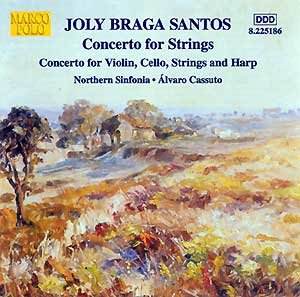Joly Braga Santos was until recently one of Portugal's best kept
secrets. Largely thanks to Marco Polo his cover has now been well and
truly blown, and this issue of orchestral music for strings makes a substantial
pendant to their CDs featuring five of the six symphonies. Portuguese maestro
Álvaro Cassuto worked closely with Braga Santos for many years before his
sudden and early death in 1988, and his readings of these four works carry the
same authentic mastery as his ear-opening recordings of the symphonies.
Braga Santos's admirers will find the furthest reaches of his musical odyssey
here, from the Concerto in D (1951) with its shades of Kodaly, Bartok and
Vaughan Williams, through the increasingly tortured lyricism of the
Sinfonietta (1963) to the bleak poetry of the two later works for strings
and harp. Only the mellow synthesis finally achieved in works such as the
Divertimento No.2 (1978) is missing from Cassuto's survey. The huge gulf
between the confident, modal writing of the 1940's and 50's and the
introspective poet of the 60's and beyond can seem as disconcerting here as in
the symphonies. Consistent musical personality is tricky to pin down, although
rhythmic drive and a penchant for juxtapositions of extreme tempi provide
something of a Braga Santos signature. In truth, such things mattered little to
him. As the critic Joao de Freitas Branco said, "He distinguished between
being the first to do this or that, and the only one to do it this way".
When all is said and done, any suspicion that the later Braga Santos succumbed
to self-doubt and fashionable atonality is quelled by the sheer musical quality
of all four works here.
Anyone who responds to Vaughan Williams or Kodaly will love the Concerto
in D, a three movement classic of the string repertoire which deserves
to be much better known. The deeply-felt, elegiac tread of the slow
movement (played at the composer's own funeral) is specially good, once
heard never forgotten. The English Sinfonia prove more incisive,
vigorous interpreters than the Orquestra Classica de Porto on
the rival version from Koch Schwann, and good though that version was,
the new one is preferable - even more so in the bleaker shadows of the
Martin-like Sinfonietta, another vital, three movement work which
demands more confidence and imagination than the Porto players under
Misha Meisky provided. That Koch CD remains indispensable, though,
for the equally absorbing 2nd Divertimento, Staccato brilhante
and Elegy for Vianna da Motta, none otherwise available in the
UK catalogue.
 The
two works for concertante strings and harp are initially a forbidding
shock to the system; but their darkly brilliant, fine-spun poetry deepens
on acquaintance, and there's no doubt that this is music of quality,
structurally cogent as well as subtly imagined for its instrumental
forces. The 1967 Variations are enigmatic, almost too highly
compressed (thank goodness for Cassuto's detailed, highly enlightening
notes on this and the other pieces) but the more expansive three-movement
work from the same year - a Double Concerto in the baroque rather
than romantic sense, with the two string soloists first amongst equals
- recaptures the winning certitude of the earlier works.
The
two works for concertante strings and harp are initially a forbidding
shock to the system; but their darkly brilliant, fine-spun poetry deepens
on acquaintance, and there's no doubt that this is music of quality,
structurally cogent as well as subtly imagined for its instrumental
forces. The 1967 Variations are enigmatic, almost too highly
compressed (thank goodness for Cassuto's detailed, highly enlightening
notes on this and the other pieces) but the more expansive three-movement
work from the same year - a Double Concerto in the baroque rather
than romantic sense, with the two string soloists first amongst equals
- recaptures the winning certitude of the earlier works.
Here both Bradley Creswick and Alexander Somov pitch
their contribution appropriately this side of showy virtuosity, and
the clear recording - a mite congested at climaxes - generally helps
clarify the subtle strands of Braga Santos's writing. Cassuto at the
helm of an English Sinfonia at the top of their form adds to the appeal
of a fine issue which does much to fill out our picture of this most
worthwhile and surprising initiate into the ranks of indisputably great
20th century composers. Now, Marco Polo, please give us the operas!
Christopher Webber


